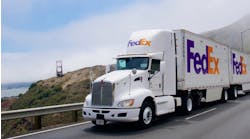Overall, trucking insurance rates are about as low as they are ever going to go, according to results of the Transportation Insurance Pricing Survey (TIP) for the third quarter of 2010, conducted by the NIP Group. However, that’s not the case when it comes to premiums for worker’s compensation – and NIP’s data indicates those premiums could start rising significantly for carriers.
“To summarize, transportation insurance rates have been skipping along the bottom now for the last several quarters and there’s not a whole lot of material upward movement to be expected,” Richard Augustyn, NIP’s CEO, told Fleet Owner. “The exception, however, is worker’s comp. The feedback we’re getting is that worker’s comp rates may be starting to trend up.”
He noted that a significant number of respondents to NIP’s third quarter survey - over 50% - indicate worker’s comp rates are flat or up from the second quarter.
“The issue is twofold,” Augustyn explained. “First, medical costs increased faster than projected. Second, the slow pace of economic recovery means ‘return to work’ opportunities remain limited. As a result, injured workers are staying off the job far longer than they were two years ago.”
That means insurance underwriters are paying out more in worker’s comp claims than they predicted, and so many are starting to beef up their reserves to cover those claims – and passing on those costs to customers.
For example, insurance giant American International Group (AIG) announced last month that it took a $4.2 billion net charge against its fourth quarter 2010 earnings to strengthen loss reserves at its Chartis insurance subsidiary to compensate for “emerging industry loss trends, primarily in asbestos and worker’s compensation,” noted Robert Benmosche, AIG’s president & CEO, in the company’s annual report.
“Our reserve review updated our estimated losses for all years, including the more recent accident years 2006 to 2009 – years to which approximately 50% of the reserve strengthening, excluding asbestos, applied,” he noted.
Outside of worker’s comp premiums, however, NIP’s Augustyn said transportation insurance “remains a buyer’s market” with more than enough underwriting capacity available.
“Our TIPS results indicate that rate decreases are in line with last quarter, with underwriters in a few segments and lines of business pushing back in an attempt to hold rates flat,” he added. “Overall, survey responses indicate that the transportation insurance market remains soft. In addition, participants believe that there has not been much change in carrier behavior since last quarter. Rates continue to fall across all account sizes in line with the [second] quarters’ results.”



